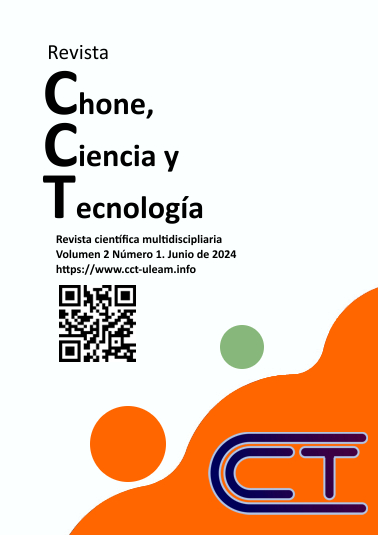Listening comprehension activities in the teaching-learning process of the English language
DOI:
https://doi.org/10.56124/cct.v2i1.002Keywords:
Listening comprehension, teaching-learning process, activities, English language.Abstract
The objective of this article is the elaboration of activities, to favor the development of listening comprehension in the teaching-learning process of students who showed insufficiencies in the listening comprehension of the English language at the "Cinco de Mayo" Fiscomisional Educational Institution. It is a field-action research and research methods such as analysis-synthesis and inductive-deductive method with mixed approach were used to determine the students' listening comprehension level and the elaboration of the proposal. The instruments used were: classroom observation cards and diagnostic test applied to the students to determine the level of listening comprehension in English, interview with English teachers to learn about the information they have about the current practices of teaching listening comprehension. The population consisted of 214 students. The sample consisted of 63 eighth grade students and 4 English teachers. The analysis of the results indicated that the activities used are insufficient to develop listening comprehension and that the proposal contributes to its development by approaching it from a set of activities focused on the integral development of listening comprehension, considering the students' ability levels.
Downloads
References
Abreus González, P. A., Martínez Molina, P. D. ., & Castiñeira Enríquez, P. A. . (2020). EL DESARROLLO DE LA COMPRENSIÓN AUDITIVA EN INGLÉS MEDIANTE LA AUDICIÓN EXTENSIVA. Revista Qualitas , 19(19), 077-094. Recuperado a partir de https://revistas.unibe.edu.ec/index.php/qualitas/article/view/35
Antich de León, R., Gandarias Cruz, D., & López Segrera, E. (1986). Metodología de la enseñanza de lenguas extranjeras. Pueblo y Educación. Obtenido de: https://search.worldcat.org/es/title/Metodologia-de-la-ensenanza-de-lenguas extranjeras/oclc/807234707
Arévalo, J. M. (2019). La comprensión auditiva en inglés como lengua extranjera. De la metacognición a la competencia comunicativa. Revista Internacional de Lenguas Extranjeras/International Journal of Foreign Languages, (11). doi: https://doi.org/10.17345/rile11.2634
Asencio, J. M. (2022). Podcasts as an alternative to practice listening comprehension. La Libertad. UPSE, Matriz. Facultad de Ciencias de la Educación e Idiomas. 62p. https://repositorio.upse.edu.ec/handle/46000/8881
Cocha, R. G. & Morales, C. A. (2017). El uso de material auténtico (listening) para el desarrollo de la destreza auditiva del idioma inglés en los estudiantes de primer año de bachillerato de la Unidad Educativa “Guayaquil” del cantón Ambato. https://repositorio.uta.edu.ec/jspui/handle/123456789/24854
Córdoba Cubillo, P., Coto Keith, R., & Ramírez Salas, M. (2005). La comprensión auditiva: definición, importancia, características, procesos, materiales y actividades. Actualidades Investigativas En Educación, 5(1). doi:https://doi.org/10.15517/aie.v5i1.9123
EF Education First. (2021). EF EPI in Ecuador. Obtenido de: https://www.ef.com/wwen/epi/regions/latin-america/ecuador/
Gilakjani, A. P., & Sabouri, N. B. (2016). Learners’ Listening Comprehension Difficulties in English Language Learning: A Literature Review. English Language Teaching, 9(6), 123-133. doi:http://dx.doi.org/10.5539/elt.v9n6p123
Indahsari, D. (2020). Using podcast for EFL students in language learning. JEES (Journal of English Educators Society), 5 (2), 103–108. doi:https://doi.org/10.21070/jees.v5i2.767
Jyoti, R. (2020). Exploring English Language Students’ Difficulties in Listening Comprehension. Journal La Edusci, 1(3), 1-10. doi: https://doi.org/10.37899/journallaedusci.v1i3.125
Machado Falconi, E. F., & Quel Rosero, R. F. (2014). Estrategias metodológicas que utilizan los docentes para el desarrollo de comprensión auditiva del idioma Inglés en los octavos años de Educación Básica de la Unidad Educativa Experimental Teodoro Gómez de la Torre año 2012-2013 [Tesis de pregrado, Universidad Técnica del Norte]. Recuperado de http://repositorio.utn.edu.ec/handle/123456789/2606
Neurociencias (S.f.). Los mecanismos cerebrales involucrados en el procesamiento de la información auditiva. Obtenido de: https://neurociencias.org.es/los-mecanismos-cerebrales-involucrados-en-el-procesamiento-de-la-informacion-auditiva#:~:text=La%20neurociencia%20de%20los%20mecanismos%20neurales%20de%20procesamiento,auditivas%20y%20las%20transforma%20en%20una%20percepci%C3%B3n%20significativa
Peris, E. M. (2007). La didáctica de la comprensión auditiva. MarcoELE. Revista de Didáctica Español Lengua Extranjera, (5), 1-18. http://hdl.handle.net/10230/24749
Syakur, A. (2020). Improving the eighth grade students’ listening comprehension achievement by using dictation techniques. Konfrontasi: Jurnal Kultural, Ekonomi dan Perubahan Sosial, 7(3), 205-216. doi.https://doi.org/10.33258/konfrontasi2.v7i3.116
Tran, T. Q., & Duong, T. M. (2020). Insights into Listening Comprehension Problems: A Case Study in Vietnam. PASAA: Journal of Language Teaching and Learning in Thailand, 59, 77-100. doi:10.58837/CHULA.PASAA.59.1.4
Additional Files
Published
Issue
Section
Categories
License
Copyright (c) 2024 Cristhian Bladimir Alcivar Zambrano, Julissa Maricela Loor Moreira, Mg. Raisa Macias Sera

This work is licensed under a Creative Commons Attribution-NonCommercial-NoDerivatives 3.0 Unported License.
Protección intelectual y licencia. La Revista y cada uno de los artículos y ensayos que se publican están licenciados por Creative Commons 3.0 Ecuador (CC), que establece: "Atribución - No Comercial - Sin Derivadas", lo cual indica que:
- Compartir: el material puede ser distribuido, copiado y exhibido por terceros siempre que se le atribuya el crédito al autor/a.
- Atribución: El autor debe dar crédito de manera adecuada, brindar un enlace a la licencia, e indicar si se han realizado cambios. Puede hacerlo en cualquier forma razonable, pero no de forma tal que sugiera que usted o su uso tienen el apoyo de la licenciante.
- No comercial: No se puede hacer uso del material con propósitos comerciales.
- SinDerivadas — Si remezcla, transforma o crea a partir del material, no podrá distribuir el material modificado.
No hay restricciones adicionales — No puede aplicar términos legales ni medidas tecnológicas que restrinjan legalmente a otras a hacer cualquier uso permitido por la licencia.
Lectores (as). La Revista permite la posibilidad de que los lectores o lectoras puedan, de forma gratuita, descargar, almacenar, copiar y distribuir la versión final aprobada y publicada (post print) del artículo, siempre y cuando se realice sin fines comerciales, no se generen obras derivadas y se mencione la fuente y autoría de la obra.
Autores (as). La Revista permite la publicación del post-print en repositorios y sitios web. La Revista coloca a disponibilidad los artículos, en repositorios de terceros, inmediatamente después de su publicación.







